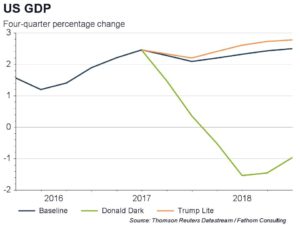A sideways look at economics
Imagine a world in which Donald Trump is the President of the United States, and where he delivers much of what he has promised.
The newly inaugurated President sets the ball rolling with a trade war, slapping import tariffs on Mexico and China. Foreign countries and US firms respond with lawsuits. Then a wall is built between Mexico and the US. Fearing the blocking of remittances, the neighbour to the south caves in and foots the bill. The US population starts to fall as Mr Trump oversees the mass deportation of illegal immigrants. Things get very messy, and the US economy goes into recession. This is the world of Donald Dark.
Far-fetched? Well, yes a little. But it is increasingly evident that public opinion across much of the Western world has shifted away from the integrationist ideals of economists, towards a belief in the benefits of isolationism, of cutting oneself off from the rest of the world.
One can only hope that, once in office, Mr Trump would be unwilling, or unable, to push ahead with many of his more extreme policies. There are, after all, a number of checks and balances limiting the powers of a US President. Moreover, thanks to Mr Trump’s pledge to cut taxes and increase government spending, we can even envisage a ‘Trump Lite’ world, where US GDP is a little higher than it might have been otherwise!
Whatever the outcome of next month’s US elections, populist politics are on the rise. How did we get here, and where do we go next? Join us on Tuesday 1st November at Thomson Reuters in Canary Wharf where we will discuss the political economy with Bill Johnson, Emeritus Fellow of Politics at Magdalen College, Oxford, and present our latest Global Economic and Markets Outlook.
